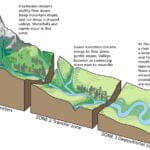Rivers aren’t just pretty bodies of water—they’re the lifeblood of our planet, essential for human survival and the health of our ecosystems. From providing the water we drink to shaping the very landscapes we inhabit, rivers play a crucial role in our world. Let’s explore ten ways rivers sustain us and why their protection is paramount for a thriving future.

1. The Essence of Life: Providing Fresh Water
Perhaps the most obvious yet crucial benefit of rivers is their role as providers of freshwater. Rivers are the source of drinking water for millions of people worldwide. This access to clean water is fundamental for human health, sanitation, and the overall well-being of communities.
2. Nourishing the World: Supporting Agriculture
Agriculture, the backbone of human civilization, relies heavily on rivers. River water is essential for irrigating crops, particularly in regions where rainfall is scarce or unreliable. This irrigation supports food security for billions of people and enables the production of a wide range of agricultural products.
3. Nature’s Delivery Service: Transporting Nutrients and Sediment
Rivers act as natural conveyor belts, transporting vital nutrients and sediment that enrich ecosystems and support life. These nutrients are carried downstream, fertilizing soil, replenishing wetlands, and supporting the productivity of both aquatic and terrestrial environments.
4. Biodiversity Hotspots: Supporting a Wealth of Life
Rivers are teeming with life, hosting a remarkable diversity of plant and animal species. From microscopic organisms to large mammals, rivers provide habitat, breeding grounds, and migration corridors for countless species. This biodiversity is not only fascinating; it’s crucial for maintaining the ecological balance of our planet.
5. Powering our World: Generating Renewable Energy
The energy of flowing water in rivers can be harnessed to generate electricity through hydroelectric power plants. This renewable energy source provides a cleaner alternative to fossil fuels, contributing to a reduction in greenhouse gas emissions and mitigating climate change.
6. Navigating Our World: Facilitating Transportation and Trade
For centuries, rivers have served as natural transportation routes, connecting communities and facilitating trade. From ancient civilizations using rivers for commerce to modern-day shipping routes transporting goods across continents, rivers continue to play a vital role in global trade and economic development.
7. Shaping Our Landscapes: A Force of Nature
Over time, the flow of rivers shapes the Earth’s surface, carving out valleys, creating fertile floodplains, and depositing sediment that forms new land. This dynamic geological process influences the landscapes we see around us, contributing to the diversity and beauty of our planet’s topography.
8. Cultural Cornerstones: Inspiring Art and Tradition
Rivers have long held cultural and spiritual significance for human societies worldwide. They have inspired countless works of art, literature, music, and folklore. For many communities, rivers are deeply intertwined with their cultural identity, traditions, and spiritual beliefs.
9. A Source of Recreation: Revitalizing Body and Soul
Beyond their practical importance, rivers provide us with opportunities for recreation, relaxation, and connecting with nature. Activities like swimming, boating, fishing, and simply enjoying the tranquility of a riverside setting offer numerous physical and mental health benefits.
10. Climate Change Allies: Absorbing Carbon Dioxide
Rivers, particularly those surrounded by healthy riparian zones, play a role in mitigating climate change by absorbing carbon dioxide from the atmosphere. This carbon sequestration helps to regulate the Earth’s climate and reduce the impacts of greenhouse gas emissions.
In geography, rivers play a vital role in shaping our environment and supporting human life. Discover the 10 importance of rivers to man in geography and how they have influenced civilizations throughout history. Learn more
Rivers are of great significance to Nigeria, providing essential resources and contributing to the country’s development. Explore the 10 importance of rivers to man in Nigeria and their impact on various sectors such as agriculture, transportation, and tourism. Read more
The significance of road transport cannot be overstated in today’s fast-paced world. Understand the 10 importance of road transport in facilitating trade, connecting communities, and promoting economic growth. Explore further
Transportation plays a crucial role in enabling the movement of people and goods across different regions. Discover the 10 importance of transportation and how it serves as the lifeline of modern societies. Find out more
In the realm of marketing, transportation holds immense value, ensuring the smooth flow of products from manufacturers to consumers. Explore the 10 importance of transportation in marketing and how it influences the success of businesses in today’s competitive market. Uncover insights

How Can Rivers and Lakes Benefit Local People?
The benefits of rivers and lakes extend far beyond their ecological importance, directly impacting the lives of people residing near them.
- Freshwater Lifeline: Rivers are primary sources of clean drinking water, particularly in areas where access to treated water is limited. This readily available freshwater is essential for drinking, sanitation, and hygiene, contributing significantly to public health.
- Agricultural Powerhouse: River water is a lifeline for agriculture, providing irrigation for crops and supporting livestock production. Access to this water source is particularly critical in regions with limited rainfall, ensuring food security and livelihoods for countless communities.
- Biodiversity Haven: Rivers and lakes support a wealth of biodiversity, providing habitat for a vast array of aquatic and riparian species. These ecosystems offer numerous benefits, including natural flood control, water filtration, and nutrient cycling, all of which contribute to the overall health and well-being of local communities.
- Source of Renewable Energy: The power of flowing water in rivers can be harnessed to generate hydroelectric power, providing a clean and sustainable energy source to local communities. Hydropower reduces dependence on fossil fuels, mitigating climate change and promoting energy independence.
What is a river short paragraph?
Rivers, the lifeblood of our planet, are dynamic waterways that shape landscapes, sustain ecosystems, and inspire civilizations. These natural channels carry precious freshwater from mountains to oceans, supporting a rich tapestry of life along the way. Rivers serve as vital resources for drinking water, agriculture, transportation, and energy production, while also providing inspiration for art, culture, and recreation. Protecting and preserving these invaluable waterways is essential for the health of our planet and the well-being of generations to come.
[Citation: Britannica, The Editors of Encyclopedia. “River.” Encyclopedia Britannica,].
How do rivers and lakes benefit the economy of the United States?
Rivers and lakes are not just scenic wonders; they are economic powerhouses driving growth and prosperity across the United States.
- Abundant Freshwater for Industry: The access to a plentiful supply of fresh water from rivers and lakes is a cornerstone of many industries. From agriculture and manufacturing to energy production and tourism, these water resources support a wide range of economic activities, creating jobs and generating revenue.
- Thriving Tourism and Recreation: Rivers and lakes attract millions of visitors annually, eager to enjoy the natural beauty and recreational opportunities these waterways offer. This influx of tourists supports local businesses, from hotels and restaurants to tour operators and outdoor gear retailers, injecting significant revenue into local economies.
- Job Creation and Economic Opportunity: A wide array of jobs, both directly and indirectly, rely on healthy rivers and lakes. These include those in the fishing and tourism industries, as well as those involved in transportation, water management, and environmental conservation efforts. These jobs are often rooted in local communities, providing stable employment opportunities and contributing to economic stability.
- Increased Property Values and Investment: Properties situated near water, whether a lakefront home or a city apartment with a river view, are highly desirable and often command higher prices. This increased property value translates into higher property tax revenues, which can then be reinvested in public services, infrastructure improvements, and community development initiatives.
Why are rivers important in Ghana?
Rivers are the lifeblood of Ghana, playing a pivotal role in the nation’s economy, environment, and cultural heritage.
- Water Security for Millions: Ghana’s rivers are essential sources of drinking water, particularly for rural communities where access to piped water systems may be limited. This access to freshwater is crucial for supporting human health, sanitation, and overall well-being.
- Agricultural Backbone: Agriculture, a cornerstone of Ghana’s economy, depends heavily on the availability of water for irrigation. Rivers provide this vital resource, enabling the cultivation of crops, particularly during the dry season, and supporting the livelihoods of countless farmers.
- Transportation and Trade: Ghana’s rivers have historically served as crucial transportation routes, connecting communities and facilitating trade both domestically and internationally. These waterways provide a cost-effective means of transporting goods, such as agricultural produce, timber, and minerals, contributing to economic growth and connectivity.
- Biodiversity Hotspots: Ghana’s rivers and their surrounding ecosystems are home to a rich diversity of plant and animal species. These areas support numerous fish species, which are a vital source of protein and income for local communities, as well as other wildlife that contribute to the ecological balance of the region.
Why are Rivers Important to Local People?
Rivers are not merely geographical features; they are lifelines for communities, intricately woven into the fabric of local life, culture, and economic well-being.
- Source of Life and Livelihoods: For communities residing near rivers, these waterways are more than just bodies of water; they are sources of sustenance, livelihood, and cultural significance. Rivers provide essential drinking water, irrigation for agriculture, and fish for food, directly impacting the health, well-being, and economic security of local populations.
- Natural Transportation Routes: Historically, rivers have been instrumental in connecting communities, facilitating trade, and enabling the movement of people and goods. In many regions, rivers remain important transportation corridors, particularly where road infrastructure is limited, linking remote areas to markets and essential services.
- Cultural Heritage and Spiritual Connection: Rivers often hold deep cultural and spiritual significance for communities, serving as sacred sites, sources of inspiration for art and folklore, and places for social gatherings and rituals. These cultural connections to rivers foster a sense of identity, community, and belonging.
- Recreational Opportunities and Well-being: Rivers offer respite from the hustle and bustle of daily life, providing opportunities for recreation, relaxation, and connecting with nature. Activities like swimming, fishing, boating, and simply enjoying the tranquility of a riverside setting contribute to the physical and mental well-being of local people.
Why is it important for people to live near freshwater?
Throughout history, human settlements have flourished near freshwater sources like rivers and lakes, and for good reason– proximity to these waterways offers a myriad of benefits that are essential for survival, prosperity, and a high quality of life.
- Access to Clean Drinking Water: The most fundamental reason for living near freshwater is the ready availability of clean drinking water. This access is crucial for quenching thirst, supporting sanitation and hygiene, and maintaining good health, particularly in regions where access to treated water supplies may be limited or unreliable.
- Food Security through Agriculture: Freshwater sources are vital for agriculture, providing the irrigation necessary for crops to thrive. Living near rivers and lakes enables communities to cultivate land and produce food, supporting food security and providing livelihoods for farmers and those involved in the agricultural sector.
- Natural Transportation Routes: Historically, rivers and lakes have served as natural highways, connecting communities and facilitating trade. Even today, these waterways continue to play a role in transportation, offering a cost-effective means of moving people and goods, particularly in regions where road infrastructure is limited or challenging to navigate.
- Economic Opportunities and Growth: The presence of freshwater sources attracts various industries, including fishing, agriculture, tourism, and recreation, creating job opportunities and stimulating economic growth in surrounding communities. These economic benefits contribute to improved living standards and overall well-being.
How are the Great Lakes helpful to people?
The Great Lakes, a collection of five interconnected freshwater lakes in North America, are a testament to the profound impact these massive bodies of water have on human populations and the environment alike.
- A Vital Source of Freshwater: Containing approximately 20% of the world’s surface freshwater, the Great Lakes provide a crucial source of drinking water for millions of people in the surrounding region, supporting the health and well-being of countless communities.
- Supporting a Thriving Fishing Industry: The Great Lakes are home to a diverse array of fish species, supporting a significant commercial and recreational fishing industry. This thriving industry provides jobs, food security, and economic benefits to the region.
- Generating Renewable Hydroelectric Power: The flow of water between the Great Lakes is harnessed by hydroelectric power plants, generating a substantial amount of clean energy. This renewable energy source reduces dependence on fossil fuels, mitigating climate change and promoting a more sustainable energy future.
- A Haven for Recreation and Tourism: The scenic beauty and recreational opportunities offered by the Great Lakes attract millions of visitors each year, boosting tourism and generating significant revenue for local businesses. From boating and fishing to swimming and simply enjoying the breathtaking views, the Great Lakes offer a welcome escape and contribute to the quality of life for residents and visitors alike.
How do rivers and lakes affect local tourism?
Rivers and lakes often serve as magnets for tourists, drawn to the natural beauty, recreational opportunities, and unique experiences these waterways offer, benefiting local economies and communities in numerous ways.
- Adventure and Water Sports: Rivers, with their flowing currents and diverse landscapes, provide a natural playground for adventure-seekers and water sports enthusiasts. Activities like white-water rafting, kayaking, canoeing, and tubing attract thrill-seekers from around the globe, generating revenue for tour operators, equipment rental businesses, and local accommodations.
- Fishing and Wildlife Viewing: Rivers and lakes teem with fish species, attracting anglers of all levels, from seasoned professionals to families seeking a relaxing day by the water. Additionally, the diverse ecosystems surrounding these waterways often support a rich variety of birdlife and other wildlife, providing opportunities for birdwatching, wildlife photography, and guided nature tours.
- Cultural Heritage and Historical Significance: Many rivers and lakes are steeped in history and cultural significance, attracting visitors interested in exploring ancient ruins, learning about indigenous traditions, or experiencing the unique cultural heritage of a region. This type of tourism can provide economic opportunities for local communities while preserving and celebrating their cultural identity.
- Scenic Beauty and Relaxation: Sometimes, the simplest pleasures are the most alluring. The tranquility of a lake, the gentle sounds of a flowing river, and the opportunity to immerse oneself in nature are powerful draws for tourists seeking respite from the stress of daily life. This type of tourism supports businesses like lakeside resorts, scenic boat tours, and restaurants offering picturesque waterfront dining experiences.
How does your locality benefit from a nearby river or stream?
While the specific benefits of a nearby river or stream will vary depending on the location and characteristics of the waterway, there are several common ways these natural features enrich the lives of those living nearby.
- Source of Clean Water and Sanitation: Rivers and streams often serve as the primary source of water for drinking, sanitation, and irrigation, particularly in areas where access to treated water systems is limited. This access is fundamental for public health, supporting hygiene, reducing the risk of waterborne diseases, and improving overall well-being.
- Flood Control and Water Regulation: Healthy rivers and streams play a crucial role in regulating water flow, mitigating the risks of flooding during periods of heavy rainfall. These waterways act as natural buffers, absorbing excess water and gradually releasing it downstream, reducing the severity of floods and protecting communities from their devastating impacts.
- Supporting Local Ecosystems and Biodiversity: Rivers and streams are biodiversity hotspots, providing habitat for a wide range of plants, fish, insects, and other wildlife. These riparian ecosystems contribute to a healthy environment, supporting pollination, nutrient cycling, and natural pest control, which can benefit agriculture and overall ecological balance in the region.
- Recreational Opportunities and Community Cohesion: Rivers and streams provide invaluable recreational opportunities for local communities, offering spaces for swimming, fishing, boating, picnicking, and simply enjoying the tranquility of nature. These shared spaces foster community cohesion, promote physical activity, and enhance the overall quality of life for residents.
Why are the Great Lakes an important waterway for our country?
The Great Lakes, a system of five interconnected freshwater lakes in North America, are much more than just scenic bodies of water; they are a vital economic and ecological engine, playing a crucial role in the prosperity and well-being of the United States and Canada.
- A Maritime Superhighway: The Great Lakes Waterway, a system of canals and locks connecting the lakes, has earned the nickname “the Fourth Sea Coast” for a reason. This intricate network enables large freighters to navigate the lakes, transporting vast quantities of goods, including iron ore, coal, grain, and manufactured products, between the Midwest and the Atlantic Ocean. This efficient and cost-effective transportation route is a cornerstone of industrial and agricultural activity in the region.
- Economic Powerhouse: The shipping industry that relies on the Great Lakes Waterway is a significant driver of economic activity, generating billions of dollars in revenue and supporting hundreds of thousands of jobs in sectors like manufacturing, agriculture, transportation, and logistics. These economic benefits extend far beyond the Great Lakes region, impacting the national and international economies.
- Ecological Treasures: The Great Lakes basin is a globally significant ecosystem, home to a diverse array of plant and animal species, many of which are found nowhere else on Earth. These lakes provide habitat, breeding grounds, and migration corridors for numerous fish, bird, and mammal species, contributing to the ecological health and biodiversity of the region.
- Recreational Paradise: The scenic beauty and abundant recreational opportunities offered by the Great Lakes draw millions of visitors annually. From boating and fishing to swimming and simply enjoying the breathtaking vistas, these lakes provide a welcome escape and contribute significantly to the tourism industry, supporting local businesses and boosting regional economies.
Protecting the health and vitality of the Great Lakes is not just an environmental imperative; it’s an economic one. Preserving water quality, managing invasive species, and mitigating the impacts of climate change are crucial to ensuring that these majestic lakes continue to provide their invaluable benefits for generations to come.
















